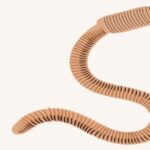As an Amazon Associate, this site earns commissions from qualifying purchases. For more details, click here.
Venus flytraps stand out because they eat flying insects. But what about worms and other crawling bugs? Would the plant benefit from having these in their diet or should they be avoided at all cost? This is what this article will explain in detail.
Venus flytraps can eat live, dead and freeze dried worms. But you should not feed earthworms to the plant because they are too large and will cause the leaves to rot.
What Worms Can I Feed a Venus Flytrap?
Mealworms and bloodworms are good sources of nutrition for Venus flytraps. Though these plants usually eat flying insects, worms can and do find their way into the trap.
If you want to give freeze dried mealworms for your Venus flytrap, look for a quality brand and make sure it is rich in nutrients and can make Venus flytraps healthier and live longer.
Because freeze dried mealworms are readily available, you will have no problem with supplies. A single pack is good for several Venus flytraps for years.
Some traps might be too small for the worm, but a bit of grinding solves that problem. This is something you should do for any Venus flytrap food. Ensure the food is small enough so it is a third the size of the trap.
Feeding the plant freeze dried worms is easy. Thaw the frozen worm if you have not already. Place the bits into the trap, careful not to fill it. Use a stick or tweezers to stimulate the trigger hairs and the trap will close.
To add variety to its diet, you can add Killer Plant Venus Flytrap Food to its diet. It contains the nutrients Venus flytraps need and is also suitable for other carnivorous plants.
Bloodworms are just as healthy as mealworms. They are cost effective and provide a healthy alternative for indoor Venus flytraps that don’t get to eat a lot of insects.
For frozen bloodworms or any freeze dried food, follow the package instructions. You only need to give a small amount to your Venus flytrap and it will be enough.
Venus flytraps only need to eat every 2 to 4 weeks so these worms will last a while. If the plant is outdoors there should be plenty of food available for it. There are lots of insects to keep your Venus flytrap healthy.
Feeding bloodworms is the same as with mealworms. Take just enough so it fills a third of the trap (remember, only one trap at a time needs to eat). Stimulate the hair triggers with a stick or better yet Jessie Mae Tweezers, gently prodding it until it closes.
What Worms Should I Avoid Giving to a Venus Flytrap?
Do not feed Venus flytraps earthworms or any worms that are larger than its trap. A large worm will eat through the leaves and could lead to leaf rot.
To keep it even simpler, do not give Venus flytraps any food that is bigger than its traps. If a freeze dried bloodworm is too big, either give only half to the plant or look for a smaller worm.
Even if the earthworm cannot escape, it is too large and its ends will protrude out of the leaf. Once the trap starts digesting the worm inside the trap, the parts hanging out will decay, and that is not good for the plant.
A Venus flytrap might be able to eat a dead earthworm if it has been cut to fit the trap. A live earthworm that gets caught in the trap is going to eat its way out.
But even so, earthworms should be avoided. The risk here is they might be too nutritious. Overfeeding a Venus flytrap will lead to digestive issues.
You can tell if a Venus flytrap consumed an earthworm by the foul smell emanating from the trap. It will also leave fluids dripping all over.
It is not fun getting rid of rotting pieces of worm inside a Venus flytrap, and if you factor in the foul odor it just is not worth it. So it is best to avoid this as much as possible.
You should also avoid putting earthworms in Venus flytrap soil. Earthworms will fertilize the soil which can be harmful to the plant.
Venus flytraps consume insects because the soil they grow in lack nutrients. That is how these plants live in the wild and that is how you should cultivate them at home.
Too much nutrients is not good for Venus flytraps. And if they need a health boost, place them somewhere with plenty of sunlight.
Should I Feed Live or Dead Worms to Venus Flytraps?
Venus flytraps eat live worms if they are small enough to fit in the trap. If it catches one outdoors, that is great. But it is easier to feed dead worms to Venus flytraps.
For one, it is easier and cheaper to buy freeze dried mealworms and bloodworms. Second, live worms can easily wiggle or damage the leaves.
If you just drop a live worm on the trap, it will cause problems especially if it is large. While mealworms and bloodworms are good for Venus flytraps, they could cause trouble if they eat their way out and end up all over the plant or soil.
As stated earlier, earthworms should be avoided because they are too large and will rot. The same thing will happen with other worms if they are too big for the leaves to hold them in.
Live worms offer no additional benefits over dead ones. You can make things easier for yourself – and safer for the Venus flytrap – by buying a freeze dried worms.
If you decide to use live worms, make sure you know what type you are giving your plant. At the very least cut off its head so it will not be able to eat it way out.
Venus flytraps do not need a lot of worms. The larger the plant the more worm bits can fit in its trap. But you have to avoid overfeeding as that is unhealthy for the plant.
If your Venus flytrap catches a lot of insects outdoors, freeze dried worms are not necessary. But if the plant is indoors and there are not too many flying insects around, giving them some mealworms or bloodworms will stimulate their growth.
What Else Should I Know about Feeding Worms to Venus Flytraps?
Venus flytraps only needs one trap to be fed, once every 1-4 weeks. The frequency depends on the variant, how healthy the plant is and its size. Do not feed it more than once a week.
Venus flytraps cannot digest food unless the trap is completely closed. That is why you can put your finger in a Venus flytrap and it will not bite. The smaller the worms the easier it is for the plant to digest.
Follow the product instructions on how to re-hydrate freeze dried worms. It usually takes a small amount of water.
Mealworms and bloodworms are ideal substitutes for insects. Nobody wants to invite flies into their home just to give their Venus flytrap something to eat. With worms, you do not have to worry if your plant is catching enough insects.
Venus flytraps do not need insects or worms during dormancy. Just let the plant “hibernate” during this period and wait for it to blossom again during spring.
When spring arrives that is when you can resume feeding it. Of course the plant will go through another growth period, so make sure the food bits are the right size for its traps.
Some other things to bear in mind:
- No two plants are ever entirely similar. Some Venus flytraps may consume more worms than others. Some may produce larger traps. When you have one of these, you will slowly recognize its traits and figure out how much to feed it.
- Bloodworms are disgusting to many people, but Venus flytraps will consume them without leaving any waste. Their nutrients are also comparable to ants and other insects.
- If there is no winter where you live, observe the plant behavior so you will know when it enters a dormant like stage. Other Venus flytraps get accustomed to the climate and remain active throughout the year.
Conclusion
Variety is the spice of life they say, and that applies to Venus flytrap meals too. Feeding them worms supplies them with necessary nutrients, but make sure that what you feed is the right type.

My fascination with carnivorous plants began many, many years ago with Venus Fly Traps. Now I am more than happy to impart what I know with other enthusiasts and those who are curious about meat eating plants.



